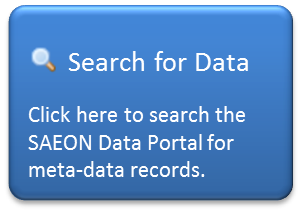Terms of Use
SAEON Data Policy
The key objective of this document is to outline the operating principles of Platform-based data sharing, primarily that data owner and user rights will be protected and to encourage data sharing.
1 Data Acquisition Policy
- The policy encourages the archiving of data for widespread current and future application. Archiving data within a trusted digital repository prevents the loss through damage and the loss of electronically stored data through software redundancy.
- Owners of data (custodians) wishing to publish, disseminate, and archive data must adhere to the following requirements:
- All datasets must be accompanied by metadata. The meta-data must be chosen from the guidelines in the architecture framework[1].
- Meta-data is preferably managed by the custodian, using suitable software[2]. The software should allow the automated harvesting of meta-data through an accepted protocol.
- Meta-data can also be exchanged manually until such time as automated systems can be put in place.
- In general, meta-data provides information about data acquisition. The following options are foreseen by the policy:
- Data is published online, openly and freely, using guidelines for standardised data services[3]. These data sets are automated and can be utilised by humans and systems without further intervention.
- Data is published online, as above, but additional credentials are required for access.
- Data is published online, as above, but additional sub-setting information is required to limit the size of service outputs.
- The user is redirected to a different portal or acquisition process.
- The user is directed to contact details, acquisition information, or other relevant information in an external website or web page.
- The rights and obligations of data providers are as follows:
- Data Providers have the right to place conditions of release on their datasets. These conditions include
- i. no release of the dataset to any potential data users;
- ii. limited access to a select group of data users, specified by the Data Provider;
- iii. public access; either with no restrictions, or providing for a release period, after which the dataset will be publicly available. This release period may have any start and end date acceptable to the Data Provider.
- All Data Providers whether they have conditions of release or not, must provide an assessment of the quality (validated, raw, or published) and status (complete or on-going) of their dataset[4].
- Data Providers are offered a notification service/ usage statistics to inform them of third-party use of their data sets.
- Data Providers have the right to place conditions of release on their datasets. These conditions include
2. Data Release and Use Policy
The framework policy encourages the public sharing of data and metadata while respecting the legal rights of the Data User and Data Provider.
2.1 Metadata
- Metadata will be made publicly available, unless it is held private as work in progress. This is done regardless of any restrictions on access to the data.
- All metadata will follow recommended standards and will minimally contain adequate information on proper citation, access, contact information, and discovery. Complete information including methods, structure, semantics, and quality control/assurance is expected for most datasets and is strongly encouraged[5].
2.2 Data
- All data, information, and research outputs generated by state-funded means should ideally be available freely and openly. This includes grant-funded university research, and data generated by state departments. It specifically excludes contract research performed for private entities by these organisations.
- The data so described should be exempted or declassified in terms of the Protection of Information Bill, as provided for in the authority of each state department[6].
- Exceptions to and qualifications of free and open access are valid, based on
- Privacy afforded to legal entities and individuals;
- Conservation considerations, mainly to protect endangered species and habitats;
- Infringement of rights afforded by the Intellectual Property Rights Act;
- Embargo periods to enable research to be published;
- Infringement of current or future legal rights to exploit natural resources;
- Cases where state departments or agencies derive a significant proportion of their income from the sale of publicly funded data.
- In case of the exceptions, organisations may allow use of the data under the following conditions:
- Use in the calculation of result data that is not restricted;
- Data providers are free to request and publish special terms and conditions to support the legal and proper use of the data provided under this policy. If such terms are not provided, this policy will apply as general terms and conditions of use.
3 Rights and Obligations of Data Users
- Use of free and open data places the following obligations on the user:
- Properly citing and acknowledging the data when used;
- Not placing additional restrictions on the data when it is provided to a third party;
- Assenting to terms and conditions if asked to do so.
- Use of restricted data requires that the data user registers within the shared platform. This allows the platform to gather usage statistics and to restrict access in accordance with the provisions of the data provider.
- Registration requires the following information from users:
- Name
- Affiliation/ organisation
- Domain of interest
- Email Address
- Acceptance of this Data Policy is implicit on registration, but further acceptance of individual data provider terms and conditions may be required from time to time.
- Information held by the portal for an individual is available to registered users under the Promotion of Access to Information Act (Act No. 2 of 2000).
- Privacy is further protected by a privacy statement, aligned with OECD provisions, that is available on request and displayed prominently on websites and portals.
[1] See Annexure D.3
[2] See Annexure D.8
[3] See Annexure D.5
[4] Refer to the minimum mandatory meta-data in Annexure D.3
[5] See Annexure D.3
[6][6] Article 19, Authority to Declassify
No
No

